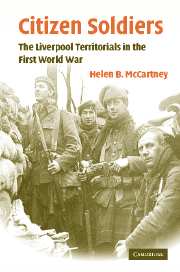Book contents
- Frontmatter
- Contents
- List of figures
- List of maps
- List of tables
- Acknowledgements
- List of abbreviations
- 1 Introduction
- 2 Pre-war Liverpool and the Territorial Force
- Part I Territorial characteristics and the morale of the soldier
- Part II Command, discipline and the citizen soldier
- Part III Attitudes and experience: the war and its aftermath
- Bibliography
- Index
- Studies in the Social and Cultural History of Modern Warfare
1 - Introduction
Published online by Cambridge University Press: 25 July 2009
- Frontmatter
- Contents
- List of figures
- List of maps
- List of tables
- Acknowledgements
- List of abbreviations
- 1 Introduction
- 2 Pre-war Liverpool and the Territorial Force
- Part I Territorial characteristics and the morale of the soldier
- Part II Command, discipline and the citizen soldier
- Part III Attitudes and experience: the war and its aftermath
- Bibliography
- Index
- Studies in the Social and Cultural History of Modern Warfare
Summary
The First World War drew ordinary British men into an army that by 1918 numbered over 5 million soldiers. Some had volunteered to serve; others had been less willing and were conscripted later in the war. Most had little contact with the military in pre-war days, and before 1914 few would have contemplated participating in war. These men were first and foremost civilians, and this book examines their experience from their initial decision to enlist, through trench warfare on the Western Front, to death, discharge or demobilization at the end of the war. It is concerned with the soldier's relationship both with the army and with home, and examines the extent to which these citizen soldiers maintained their civilian values, attitudes, skills and traditions and applied them to the task of soldiering in the period of the First World War.
The popular image of the British soldier in the First World War is that of a passive victim of the war in general and the military system in particular. On joining the army a soldier supposedly ceased to act as an individual and lost his ability to shape his world. It is an image that has been reinforced by two historiographical traditions and is largely derived from a narrow view of the British soldier presented by the self-selecting literary veterans who wrote the disillusionment literature of the late 1920s and 1930s.
- Type
- Chapter
- Information
- Citizen SoldiersThe Liverpool Territorials in the First World War, pp. 1 - 8Publisher: Cambridge University PressPrint publication year: 2005



